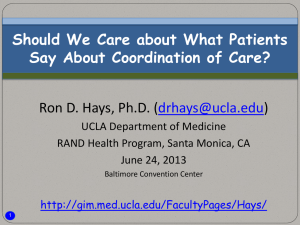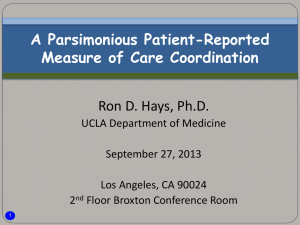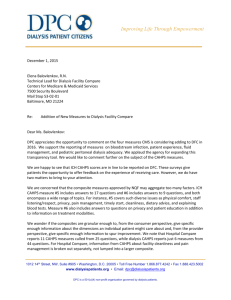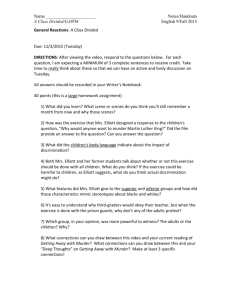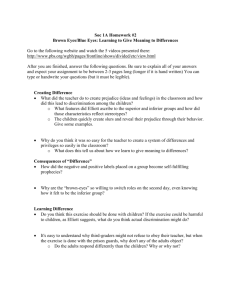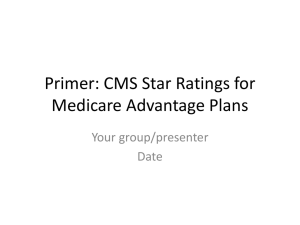Assessing patient perceptions of health care.
advertisement
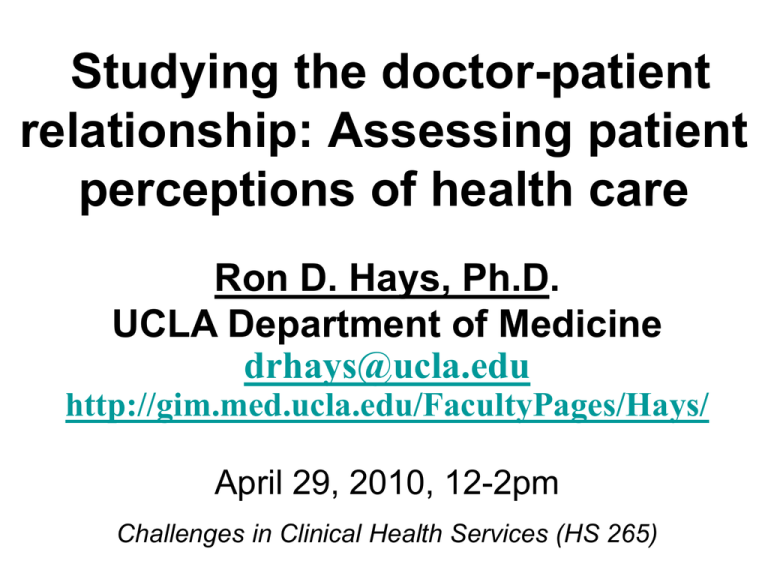
Studying the doctor-patient relationship: Assessing patient perceptions of health care Ron D. Hays, Ph.D. UCLA Department of Medicine drhays@ucla.edu http://gim.med.ucla.edu/FacultyPages/Hays/ April 29, 2010, 12-2pm Challenges in Clinical Health Services (HS 265) Fullam et al. (2009) Medical Care • 612 physicians studied from large academic medical center in midwest from 1998-2006 • 11% named in lawsuits brought against the hospital and/or physicians of the hospital • Press Ganey hospital satisfaction survey – Time doctor spent with you, concern for your questions & worries, how well kept you informed, friendliness/courtesy, skill 2 Risk of Malpractice Suit (Surgical Specialist) 7% 8% 10% 12% 14% if “very good” if “good” if “fair” if “poor” if “very poor” 3 Teams (A & B) • • • • What is patient satisfaction with care? What domains should be measured? How should it be measured? How can patient satisfaction data be used? 4 Issues • • • • Purpose Spheres and domains Periodic or visit-specific? Items – Number of response options – Global ratings versus reports • • • • Mode of administration Sample size Response rate Casemix adjustment 5 Founding Father of CAHPS 6 CAHPS® • Public domain surveys, reports, and QI tools focused on quality of care from the patient’s perspective • Information patients want and need to help select plans, groups, and providers • Core items applicable to everyone, supplemented by items targeted to specific groups https://www.cahps.ahrq.gov/ 7 CAHPS is the Standard • Consumer Assessment of Healthcare Providers and Systems • NCQA, CMS, State Medicaid, etc. • Many spheres – Plan, clinician/group, dialysis, hospital, nursing home, home health – American Indian, chiropractic, dental, behavioral health, PWMI, health information technology, medical home, pharmacy, health literacy/cultural competency https://www.cahps.ahrq.gov/content/products/PDF/PocketGuide.pdf 8 Emphasis on consumers/patients CAHPS surveys ask about aspects of care for which: – Patients are the best or only source of information – Patients and purchasers have identified as being important 9 Reports of experiences • CAHPS surveys are NOT satisfaction surveys – They do include ratings • Focus is on experiences and behaviors – More actionable, understandable, specific, and objective than general ratings 10 Standardization • Instrument – Everyone administers items in same way • Protocol – Sampling, communicating with potential respondents, and data collection procedures are standardized • Analysis – Standardized programs and procedures • Reporting – Standard reporting measures and presentation guidelines • Benchmarks – CAHPS Database 11 Multiple versions for diverse populations • Designed for all types of users – Medicaid, Medicare, commercial users, all delivery systems • Spanish language versions – Cognitive testing – Cultural comparability research 12 Extensive testing with consumers • Cognitive testing – Several rounds – Testing in Spanish as well as English • Field testing – Effectiveness and feasibility of survey administration procedures and guidelines 13 Report meaningful information • Report information that patients and purchasers say is important • Cognitive testing of report formats and language – Maximize usability and comprehensibility 14 Cast of contributors • CAHPS grantees • AHRQ and CMS Staff • Westat Staff • Stakeholders 15 Public Resource • Free! – Products • Survey and Reporting Kits (www.cahps.ahrq.gov) – CAHPS Technical assistance • Help Line (1.800.492.9261) • E-mail Help (cahps1@ahrq.gov) 16 Literature Review – the first step • Review of the relevant literature • Identification of: – The key issues – Previous research – Gaps in the literature 17 Other early input • Environmental scan for measures • Federal Register Notices • Technical Expert Panels 18 Draft Items and Test • Cognitive Interviews with members of the target population – Multiple rounds – English and Spanish – Instrument revised based on testing http://www.chime.ucla.edu/measurement/qualitativemethods.htm 19 Field Testing: The last step • Goals: – To assess how well the instruments are working – To assess different modes of survey administration 20 Typical Field Test Protocols • Mixed mode – Advance notification letter – 1st mailing of questionnaire – Reminder post card – 2nd mailing of questionnaire – Telephone follow-up • Telephone only – Advance notification letter – Telephone contact 21 Analyses of Field Test Data • Psychometric analysis to assess how well individual survey items are performing • Assess effectiveness of data collection modes and equivalence of different modes • Modeling of Unit Non-Response and Evaluation of NonResponse Weights 22 Trending • The CAHPS instruments are designed to accommodate items from existing surveys. • Testing of an integrated questionnaire will allow facilities to track the trending of data for quality improvement purposes. 23 UCLA Family Practice Group • Uses CAHPS Clinician & Group survey • Implemented performance improvement initiatives to help practices improve on CAHPS measures Multi-Phase Performance Improvement Initiative • Reporting and feedback of CAHPS scores to practices • Consultation on performance improvement methods and strategies • Quality collaborative for selected practices • Training sessions for physicians on communication with patients • Point-of-service surveys of patients • BRITE training for office staff Rationale for Visit Questionnaire • Physicians – Are familiar with visit-based evaluations – Perceive them to be more valid and credible than periodic assessments • Data may be especially useful for quality improvement Development of Visit Questionnaire • First version drafted in 2008 • Field tested in 2009 – 2 clinics from Allina Health System compared visit questionnaire with 12-month C-G questionnaire • Member of Minnesota Community Measurement, non-profit with mission to improve health by publicly reporting health care information http://www.cahps.ahrq.gov/content/products/CG/PROD_CG_CG40Products.asp Visit Questionnaire Domains (Number of items) • Composites – Doctor communication (6 items) – Office staff (2 items) – Access (5 items) • Global items – Rating of doctor (1 item) – Recommend doctor’s office (1 item) Reference Periods • Most recent visit (doctor communication, office staff ) – During your most recent visit, did this doctor explain things in a way that was easy to understand? • Yes, definitely; Yes, somewhat; No • Last 12 months (access) – In the last 12 months, when you phoned this doctor’s office after regular office hours, how often did you get an answer to your medical question as soon as you needed? • Never; Sometimes; Usually; Always Doctor Communication Composite (6 Items) During your most recent visit, did this doctor 18. Explain things in a way that was easy to understand? 19. Listen carefully to you? 21. Give you easy to understand instructions about taking care of these health problems or concerns? 22. Seem to know the important information about your medical history? 23. Show respect for what you had to say? 24. Spend enough time with you? Office Staff Composite (2 items) 28. During your most recent visit, were clerks and receptionists at this doctor’s office as helpful as you thought they should be? 29. During your most recent visit, did clerks and receptionists at this doctor’s office treat you with courtesy and respect? Access Composite (5 Items) In the last 12 months 6. When you phoned this doctor’s office after regular office hours, how often did you get an answer to your medical question as soon as you needed? 8. When you made an appointment for a checkup or routine care with this doctor, how often did you get an appointment as soon as you thought you needed? 10. When you phoned this doctor’s office during regular office hours, how often did you get an answer to your medical question that same day? Access Composite Continued 12. In the last 12 months, when you phoned this doctor’s office after regular office hours, how often did you get an answer to your medical question as soon as you needed? 13. Wait time includes time spent in the waiting room and exam room. In the last 12 months, how often did you see this doctor within 15 minutes of your appointment time? Global Items 25. Using any number from 0 to 10, where 0 is the worst doctor possible and 10 is the best doctor possible, what number would you use to rate this doctor? 26. Would you recommend this doctor’s office to your family and friends? – Yes, definitely; Yes, somewhat; No Questions? 35 CAHPS Articles (2010 and 2009) – Giordano, L.A. et al. (2010). Development, implementation and public reporting of the HCAHPS survey. Med Care Res Rev, 67, 27-37. – Mittler, J. N. et al. (2010). Market variations in intensity of Medicare service use and beneficiary experiences with care. Health Serv Res, epub ahead of print. – Keenan, P. S. et al. (2010). Geographic area variations in the Medicare health plan era. Med Care, 48, 260-266. – Zweifler, J. et al. (2010). Controlling for race/ethnicity: A comparison of California commercial health plans CAHPS scores to NCBD benchmarks. Int J Equity, 9:4 – Goldstein, E., et al. (2010). Racial/ethnic differences in patients’ perceptions of inpatient care using the HCAHPS survey. Med Care Res Rev, 67, 74-92. – Elliott, M. N. et al. (2010). Do hospitals rank differently on HCAHPS for different patient subgroups? Medical Care Research and Review, 67, 56-73. – Lehrman, W. G., Elliott, M. N., et al., (2010). Characteristics of hospitals demonstrating superior performance in patient experience and clinical process measures of care. Medical Care Research and Review, 67, 38-55. – Elliott, M. N. et al. (2009). Adjusting for subgroup differences in extreme response tendency when rating health care: Impact on disparity estimates. Health Services Research, 44, 542-561. – Elliott, M. N., et al. (2009). Components of care vary in importance for overall patientreported experience by type of hospitalization in the HCAHPS survey. Medical Care, 47, 842-849. – Beckett, M. K. et al. (2009). Outpatient satisfaction: The role of nominal versus perceived communication. Health Services Research, 44, 1735-1749. – Heller, A., Elliott, M.N. et al. (2009). Patient activation status as a predictor of patient experience among Medicare beneficiaries. Medical Care, 47, 850-857. 36 CAHPS Articles (2009) – Smeets, H. M. et al. (2009). Patient attitudes towards and experiences with an intervention programme to reduce chronic acid-suppressing drug intake in primare care. Eur J Gen Pract., 15, 219-225. – Liu, H. et al. (2009). Managed care quality and disenrollment in New York SCHIP. Am J Managed Care, 15, 910-918. – Rodriquez, H. P. et al. (2009). The effect of performance-based financial incentives on improving patient care experiences: A statewide evaluation. JGIM, 24, 1281-1288. – Gallagher, P. et al. (2009). Development of a new patient-based measure of pediatric ambulatory care. Pediatrics, 124, 1348-1354. – Rodriguez, H. P. et al. (2009). Organizational and market influences on physical performance on patient experience measures. Health Services Res, 44, 880-901. – Weidmer-Ocampo, B. et al. (2009). Adapting CAHPS for an American Indian population. J Health Care Poor Underserved, 20, 695-712. – Shimada, S. L., Zaslavsky, A. M. Zaborski, L.B., O’Malley, A. J., Heller, A. & Cleary,, P.D. (2009). Market and beneficiary characteristics associated with enrollment in Medicare managed care plans and fee-for-service. Med Care, 47, 517-523. – Liu, H., et al. (2009). Managed care quality of care and plan choice in New York SCHIP. Health Serv Res Feb. 4, epub – Keller, S, et al. (2009). The development and testing of a survey instrument for benchmarking dental plan performance: Using insured patients’ experiences as a gauge of dental care quality. J Am Dent Assoc., 140, 229-237. – Faber, M., et al. (2009). Public reporting in health care: How do consumers use quality-of-care information? A systematic review. Med Care, 47, 1-8. – Elliott, M. N., et al. (2009). Effects of survey mode, patient mix, and nonresponse on CAHPS hospital survey scores. Health Services Research, 44, 501-518. – Keenan, P.S., et al. (2009). Quality assessments by sick and healthy beneficiaries in traditional Medicare and Medicare managed care. Med Care, 47, 882-888. 37 – Martino, S. C., et al. (2009). Psychometric properties of an instrument to assess Medicare beneficiaries’ prescription drug plan experiences. Health Care Financing Review, 30, 41-53. CAHPS Articles (2008) – Scanlon, D. P., et al. (2008). Does competition improve health care quality? Health Serv Res, 43, 1931-1951. – Glazer, J. et al (2008). Using global ratings of health plans to improve the quality of health care. J Health Econ, 27, 1182-1195. – Adams, E. K. et al. (2008). Access and satisfaction among children in Georgia’s Medicaid Program and SCHIP: 2000 to 2003. Health Care Financ Rev, 29, 43-57. – Davies, E., et al. (2008). Evaluating the use of a modified CAHPS survey to support improvements in patient-centered care: Lessons from a quality improvement collaborative. Health Expect, 11, 160-176. – Shea, J. A. et al. (2008). Adapting a patient satisfaction instrument for low literate and Spanish-speaking populations: Comparison of three formats. Patient Educ Couns, 73, 132-140. – Fongwa, M. A., et al. (2008). Reports and ratings of care: Black and white Medicare enrollees. J Health Care Poor Underserved, 19, 1136-1147. – Weech-Maldonado, R. et al. (2008). Survey response style and differential use of CAHPS rating scales by Hispanics. Med Care, 46, 963-968. – Quigley, D. D., et al. (2008). Bridging from the Picker Hospital Survey to the CAHPS Hospital Survey. Med Care, 46, 654-661. – Rothman, A. A., et al. (2008). Can additional patient experience items improve the reliability of and add new domains to the CAHPS hospital survey? Health Services Research, 43, 2201-2222. – Elliott, M.N. et al. (2008). How do proxy responses and proxy-assisted responses differ from what Medicare beneficiaries might have reported after their health care? Health Service Research, 43, 833-848. – Weech-Maldonado, R. et al. (2008). Language and regional differences in evaluations of Medicare managed care by Hispanics. Health Services Research, 43, 552-568. 38 CAHPS Articles (2007 and 2006) – Zaslavsky, A. M. (2007). Using hierarchical models to attribute sources of variation in consumer assessments of health care. Stat Med., 26, 1885-1900. – Beavais, B., Wells. R., Vasey, J., & Dellifraine, J. L. (2007). Does money really matter? The effects of fiscal margin on quality of care in military treatment facilities. Hosp Top, 85, 2-15. – Caldis, T. (2007). Composite health plan quality scales. Health Care Financing Review, 28, 95-107. – Isetts, B. J., et al. (2006). Effects of collaborative drug therapy management on patients' perceptions of care and health-related quality of life. Res Social Adm Pharm. 2(1), 129-42. – Kang, N. M., et al. (2006). The evaluation criteria of internet health information. Stud Health Technol Inform. 122, 886. – Gillies, R. R., et al. (2006). The impact of health plan delivery system organization on clinical quality and patient satisfaction. Health Serv Res, 41,1181-99 – Otani, K. (2006). Enrollees' global rating process of health care with the national CAHPS Benchmarking Database. Health Care Management Review, 31, 205-212. – Darby, C. et al. (2006). Consumer Assessment of Health Providers and Systems (CAHPS): evolving to meet stakeholder needs. Am J Med Qual. 21,144-147 39 CAHPS Articles (2005-2006) – Delnoij, D. M. et al. (2006). Made in the USA: the import of American Consumer Assessment of Health Plan Surveys (CAHPS) into the Dutch social insurance system. Eur J Public Health, 16, 652-659. – Arah, O. A. et al. (2006). Psychometric properties of the Dutch version of the Hospital-level Consumer Assessment of Health Plans Survey instrument. Health Serv Research, 41, 284-301. – Bann, C. M. et al. (2005). Evaluating the effect of translation on Spanish speakers' ratings of Medicare. Health Care Financ Review, 26, 51-65. – Gary, T. L. et al. (2005). Patient satisfaction, preventive services, and emergency room use among African-Americans with type 2 diabetes. Dis Manag, 8, 361-71. – Crofton,C. et al. (2005). The CAHPS Hospital Survey: development, testing, and use. Jt Comm J Qual Patient Saf., 31, 655-9. – Robins, C. S. et al. (2005). Financial vulnerability among Medicare managed care enrollees. Health Care Financing Review, 26 , 81-92. 40 CAHPS Articles (2005) – Sofaer, S. et al. (2005). What do consumers want to know about the quality of care in hospitals? Health Serv Research, 40, 2018-36. – Goldstein, E. et al. (2005). Measuring hospital care from the patients' perspective: an overview of the CAHPS Hospital Survey development process. Health Serv Res., 40, 1977-1995. – Fredrickson, D. D., et al. (2005). Optimal design features for surveying low-income populations. J Health Care Poor Underserved, 16, 677-90. – Scholle, S. H. et al. (2005). The relationship between quality and utilization in managed care. Am J Manag Care, 11, 521-7. – Scanlon, D. P., et al. (2005). Competition and health plan performance: evidence from health maintenance organization insurance markets. Med Care, 43, 338-46. – Shea, J. A. et al. (2005). Developing an illustrated version of the Consumer Assessment of Health Plans (CAHPS). Jt Comm J Qual Patient Safety, 31, 32-42. – Kim, M. et al. (2005). Adjusting Pediatric Consumer Assessment of Health Plans Study (CAHPS) Scores to Ensure Fair Comparison of Health Plan Performances. Med Care, 43, 44-52. 41 RAND Coauthored (~73) • • • • • • • • Brown, J. A., Nederend, S. E., Hays, R. D., Short, P. F., & Farley, D. O. (1999). Special issues in assessing care of Medicaid recipients. Medical Care, 37, MS79-88. Carman, K. L., Short, P. F., Farley, D. O., Schnaier, J. A., Elliott, D. B., & Gallagher, P. M. (1999). Epilogue: Early lessons from CAHPS demonstrations and evaluations. Medical Care, 37, MS97-105. Fowler, F. J., Gallagher, P. M., & Nederend, S. (1999). Comparing telephone and mail responses to the CAHPS survey instrument. Medical Care, 37, MS41-49. Harris-Kojetin, L. D., Fowler, F. J., Brown, J. A., Schnaier, J. A., & Sweeney, S. F. (1999). The use of cognitive testing to develop and evaluate CAHPS 1.0 core survey items. Medical Care, 37, MS10-21. Hays, R. D., Shaul, J. A., Williams, V. S. L., Lubalin, J. S., Harris-Kojetin, L., Sweeny, S. F., & Cleary, P. D. (1999). Psychometric properties of the CAHPSTM 1.0 Survey measures. Medical Care, 37, MS22-31. McGee, J., Kanouse, D. E., Sofaer, S., Hargraves, J. L., Hoyt, E. & Kleimann, S. (1999). Making survey results easy to report to consumers: How reporting needs guided survey design in CAHPS. Medical Care, 37, MS32-40. Schnaier, J. A., Sweeny, S. F., Williams, V.S.L., Kosiask, B., Lubalin, J. S., Hays, R. D., & Harris-Kojetin, L. (1999). Special issues addressed in the CAHPSTM Survey of Medicare managed care beneficiaries. Medical Care, 37, MS69-78. Weidmer, B., Brown, J., & Garcia, L. (1999). Translating the CAHPS 1.0 survey instruments into Spanish. Medical Care, 37, MS89-96. 42 RAND Coauthored (continued) • • • • • • • Coulter, I.D., Hurwitz, E. L., Spritzer, K., Genovese, B. J., & Hays, R. D. (2000). A chiropractic supplemental item set for the Consumer Assessment of Health Plans Study. Topics in Clinical Chiropractic, 7, 50-56. Spranca, M., Kanouse, D. E., Elliott, M., Short, P. F., Farley, D. O., & Hays, R. D. (2000). Do consumer reports of health plan quality affect health plan selection? Health Services Research, 35, 933-947. Elliott, M. N., Swartz, R., Adams, J., Spritzer, K. L., & Hays, R. D. (2001). Casemix adjustment of the National CAHPS® Benchmarking Data 1.0: A violation of model assumptions? Health Services Research, 36, 555-573. Kimmerling, M., Spranca, M., Kanouse, D., & Phillips, S. (2001). Testing the usability and usefulness of the CAHPS® Decision Helper, version 2.0. Santa Monica, CA: RAND, DRU-2330-AHRQ. Marshall, G. N., Morales, L. S., Elliott, M., Spritzer, K., & Hays, R. D. (2001). Confirmatory factor analysis of the Consumer Assessment of Health Plans Study (CAHPS®) 1.0 core survey. Psychological Assessment, 13, 216-229. Morales, L. S., Elliott, M. N., Weech-Maldonado, R., Spritzer, K.L., & Hays, R. D. (2001). Differences in CAHPS® adult survey ratings and reports by race and ethnicity: An analysis of the National CAHPS® Benchmarking Data 1.0. Health Services Research, 36, 595-617. Morales, L. S., Weidmer, B., & Hays, R. D. (2001). Readability of CAHPS 2.0 child and adult core surveys. In M. L. Cynamon & R. A. Kulka (eds), Seventh Conference on Health Survey Research Methods (pp. 83-90). DHSS Publications No. (PHS) 01-1013, Hyattsville, Maryland. 43 RAND Coauthored (continued) • • • • • • Weech-Maldonado, R., Morales, L. S., Spritzer, K., Elliott, M., & Hays, R. D. (2001). Racial and ethnic differences in parents’ assessments of pediatric care in Medicaid managed care. Health Services Research, 36, 575-594. Weech-Maldonado, R., Weidmer, B., Morales, L., Schoeff, D., & Hays, R. D. (2001). Cross-cultural adaptation of survey instruments: The CAHPS experience. In M. L. Cynamon & R. A. Kulka (eds), Seventh Conference on Health Survey Research Methods (pp. 75-82). DHSS Publications No. (PHS) 01-1013, Hyattsville, Maryland. Damiano, P.C., Willard, J.C., Tyler, M.C., Momany, E. T., Hays, R.D., Kanouse, D.E., & Farley, D.O. (2002). CAHPS in practice: The Iowa demonstration. Journal of Ambulatory Care Management, 25, 32-42. Farley, D. O., Elliott, M. N., Short, P. F., Damiano, P., Kanouse, D. E., & Hays, R. D. (2002). Impact of CAHPS performance information on health plan choices by Iowa Medicaid beneficiaries. Medical Care Research and Review, 59, 319-336. Farley, D.O., Short, P. F., Elliott, M. N., Kanouse, D. E., Brown, J. A., & Hays, R. D. (2002). Effects of CAHPS health plan performance on plan choices by New Jersey Medicaid beneficiaries. Health Services Research, 37, 985-1007. Harris-Kojetin, L.D., Jaël, E.M.F., Smith, F., Kosiask, B. & Brown, J. (2002). What does voluntary disenrollment from Medicare+choice plans mean to beneficiaries? Health Care Financing Review, 24, 117-132. 44 RAND Coauthored (continued) • • • • • • • Short, P. F., McCormack, L., Hibbard, J., Shaul, J. A., Harris-Kojetin, L., Fox, M. H., Damiano, P., Uhrig, J. D. & Cleary, P. D. (2002). Similarities and differences in choosing health plans. Medical Care, 40, 289-302. Weidmer, B., Weech-Maldonado, R., Darby, C. & Morales, L.S. (2002). Letter to the Editor: Health risks of Latino children. JAMA, 288(16): 1982-1983. Elliott, M.N. (2003). Case-mix adjustment. Implementation of Medicare CAHPS® Fee-for-Service survey. Final report for the 2001 Survey, pps. 39-42. Elliott, M.N. (2003). Problem-oriented reporting. Implementation of Medicare CAHPS® Fee-for-Service survey. Final report for the 2001 Survey, pps. 69-72. Elliott, M.N., Hambarsoomians, K., Edwards, C., & Solomon, M. (2003). Analysis of case-mix strategies and recommendations for 2000 Medicare Fee-For-Service CAHPS®. DRU-2937-CMS. Hargraves, J. L., Hays, R.D., & Cleary, P.D. (2003). Psychometric properties of the Consumer Assessment of Health Plans Study (CAHPS®) 2.0 adult core survey. Health Services Research, 38, 1509-1527. Hays, R.D., Chong, K., Brown, J., Spritzer, K.L., & Horne, K. (2003). Patient reports and ratings of individual physicians: An evaluation of the DoctorGuide and CAHPS provider-level surveys. American Journal of Medical Quality, 18 (5), 190-196. 45 RAND Coauthored (continued) • • • • • • Iannachione, V.G., Elliott, M.N., Campbell, L.N., & Lance T. (2003). Sample selection and weighting. Implementation of Medicare CAHPS® Fee-for-Service survey. Final report for the 2001 Survey, pps. 23-28. Morales, L. S., Weech-Maldonado, R., Elliott, M.N., Weidmer, B., & Hays, R. D. (2003). Psychometric properties of the Spanish Consumer Assessment of Health Plans Survey (CAHPS). Hispanic Journal of Behavioral Sciences., 25 (3), 386-409. Weech-Maldonado, R., Morales, L. S., Elliott, M., Spritzer, K., Marshall, G. & Hays, R. D. (2003). Race/ethnicity, language and patients' assessments of care in Medicaid managed care. Health Services Research, 38 (3), 789-808. Damiano, P.C., Elliott, M., Tyler, M. C., & Hays, R D. (2004). Differential use of the CAHPS 0-10 global rating scale by Medicaid and commercial populations. Health Services and Outcomes Research Methodology, 5, 193-205. Kanouse, D.E., Spranca, M,. & Vaiana, M. (July 2004). Reporting about health care quality: A guide to the galaxy. Health Promotion and Practice, 5 (3), pp. 222-231(10). Morales, L., Elliott, M., Brown, J., Rahn, C., & Hays, R. D. (2004). The applicability of the Consumer Assessments of Health Plans Survey (CAHPS) to Preferred Provider Organizations in the United States: A discussion of industry concerns. International Journal of Quality in Health Care, 16, 219-227. 46 RAND Coauthored (continued) • • • • • • Weech-Maldonado, R., Elliott, M., Morales, L. S., Spritzer, K. L., Marshall, G., & Hays, R. D. (2004) Health plan effects on patient assessments of Medicaid managed care among racial/ethnic minorities. Journal of General Internal Medicine, 19, 136-145. Castle, N., Brown, J., Hepner, K.A., & Hays, R.D. (Dec 2005). Review of the literature on survey instruments used to collect data on hospital patients' perception of care. Health Services Research, vol 40, issue 6p2, pp. 1996-2017. Darby, C., Hays, R.D., & Kletke, P. (2005). Development and evaluation of the CAHPS® Hospital Survey. Health Services Research, vol 40, issue 6p2, pp. 1973-1976. deVries, H., Elliott, M.N., Hepner, K.A., Keller, S.D., & Hays, R.D. (2005). Equivalence of mail and telephone responses to the CAHPS® Hospital Survey. Health Services Research, vol 40, issue 6p2, pp. 2120-2139. Elliott, M.N., Edwards, C., Angeles, J., Hambarsoomians, K., & Hays, R.D. (2005). Patterns of unit and item nonresponse in the CAHPS® Hospital Survey. Health Services Research, vol 40, issue 6p2, pp. 2096-2119. Elliott, M.N., Farley, D., Hambarsoomians, K., & Hays, R.D. (2005). Do Medicaid and commercial CAHPS scores correlate within plans? A New Jersey case study. Medical Care, 43, 1027-1033. 47 RAND Coauthored (continued) • • • • • • Hepner, K.A., Brown, J.A., Hays, R.D. (2005). Comparison of mail and telephone in assessing patient experiences in receiving care from medical group practices. Evaluation and the Health Professions, 28, 377-389. Hurtado, M., Angeles, J., Blahut, S. & Hays, R.D. (2005). Assessment of the equivalence of the Spanish and English versions of the CAHPS® Hospital Survey on the quality of inpatient care. Health Services Research, vol 40, issue 6p2, pp. 2140-2161. Keller, S., O'Malley, J., Hays, R.D., Mathew, R.A., Zaslavsky, A.M., Hepner, K.A., & Cleary, P.D. (2005). Methods used to streamline the CAHPS® Hospital Survey. Health Services Research, 40, 2057-2077. Levine, R.E., Fowler, F.J. Jr., & Brown, J.A. (2005). Role of cognitive testing in the development of the CAHPS® Hospital Survey. Health Services Research, vol 40, issue 6p2, pp. 2037-2056. O'Malley, A.J., Zaslavsky, A.M., Elliott, M.N., Zaborski, L. & Cleary, P.D. (2005). Case-mix adjustment of the CAHPS® Hospital Survey. Health Services Research, vol 40, issue 6p2, pp. 2162-2181. O'Malley, A.J., Zaslavsky, A.M., Hays, R.D., Hepner, K.A., Keller, S., & Cleary, P.D. (2005). Exploratory factor analyses of the CAHPS® pilot survey responses across and within medical, surgical, and obstetric services. Health Services Research, vol 40, issue 6p2, pp. 2078-2095. 48 RAND Coauthored (continued) • • • • • • Solomon, L., Hays, R. D., Zaslavsky, A., & Cleary, P. D. (2005). Psychometric properties of the Group-Level Consumer Assessment of Health Plans Study (G-CAHPS) instrument. Medical Care, 43, 53-60. Morales, L. S., Elliott, M. N., Weech-Maldonado, R., & Hays, R. D. (2006). The impact of interpreters on parents' experiences with ambulatory care for their children. Medical Care Research and Review, 63, 110-128. Elliott, M.N., Zaslavsky, A.M., & Cleary, P.D. (2006). Are finite population corrections appropriate in profiling institutions? Health Services and Outcomes Research Methodology, 6, 153-156 Fongwa, M.N., Cunningham, W., Weech-Maldonado, R., Gutierrez, P.R., & Hays, R.D. (2006). Comparison of data quality for reports and ratings of ambulatory care by African Americans and White Medicare Managed Care enrollees. Journal of Aging and Health, 18 (5), 707-721 Ngo-Metzger, Q., Telfair, J., Sorkin, D.H., Weidmer, B., WeechMaldonado, R., Hurtado, M., & Hays, R. (October 2006). Cultural Competency and Quality of Care: Obtaining the Patient's Perspective, The Commonwealth Fund. Reise, S. P., Meijer, R. R., Ainsworth, A T., Morales, L S., & Hays, R D. (2006). Application of group-level item response models in the evaluation of consumer reports about health plan quality. Multivariate Behavioral Research, 41, 85-102. 49 RAND Coauthored (continued) • • • • • • • Hays, R.D., Brown, J., Brown, L.U., Spritzer, K.L., and Crall, J.J. (2006). Classical test theory and item response theory analyses of multi-item scales assessing parents' perceptions of their children's dental care. Medical Care, 44 (11 Suppl 3), S60-S68. Derose, K., Kanouse, D.E., Weidmer, B., Weech-Maldonado, R., Garcia, R., Hays, R.D. (2007). Developing a Spanish-language sample report for CAHPS. Joint Commission Journal on Quality and Patient Safety, 33, 681-688. Elliott, M. N., Beckett, M K., Kanouse, D. E., Hambarsoomians, K., & Bernard, S. (2007). Problem-oriented reporting of consumer evaluations of health care. Medical Care Research and Review, 64(5): 600-614. Sangl, J., Buchanan, J., Cosenza, C., Bernard, S., Keller, S., Mitchell, N., Brown, J., Castle, N., Sekscenski, E., & Larwood, D. (2007). The development of a CAHPS instrument for nursing home residents (NHCAHPS). J Aging Soc Policy, 19(2), 63-82 Reise, S. P., Morizot, J., & Hays, R. D. (2007). The role of the bifactor model in resolving dimensionality issues in health outcomes measures. Quality of Life Research, 16 (supplement 1), 19-31. Spranca, M. D., Elliott, M.N., Shaw, R. & Kanouse, D. E. Disenrollment information and Medicare plan choice: Is more information better? (2007). Health Care Financing Review, 28(3): 47-59. Teleki, S., Kanouse, D. E., Elliott, M. N., Hiatt, L., de Vries, H, & Quigley D. D. (2007). Understanding the reporting practices of CAHPS sponsors. Health Care Financing Review, 28(3), 17-30 50 RAND Coauthored (continued) • • • • • • • • Weech-Maldonado, R., Fongwa, MN., Gutierrez, P., & Hays, R. D. (2008). Language and regional differences in evaluations of Medicare managed care by Hispanics. Health Services Research., 43 (2), 552-568. Elliott, M. N., Beckett, M. K., Chong, K., Hambarsoomians, K., & Hays, R. D. (2008). How do proxy responses and proxy-assisted responses differ from what Medicare beneficiaries might have reported about their health care? Health Services Research, 43, 833-848. McCaffrey, D. F., & Elliott, M. N. (2008). Power of tests for a dichotomous independent variable measured with error. Health Services Research, 43, 10851101. Weech-Maldonado, R., Elliott, M. N., Oluwole, A., Schiller, K. C., & Hays, R. D. (2008). Survey response style and differential use of CAHPS rating scales by Hispanics. Medical Care, 46, 963-968. Quigley, D., Elliott, M. N., Hays, R. D., Klein, D., & Farley, D. (2008). Building a bridge: Continuity in measuring patient experiences of care when converting to the CAHPS® hospital survey. Medical Care, 46, 654-661. Fongwa, M. N., Cunningham, W., Weech-Maldonado, R., Gutierrez, P. R., & Hays, R. D. (2008). Reports and ratings of care: Black and White Medicare enrollees. Journal of Health Care for the Poor and Underserved, 19, 1136-1147. de Vries, H. Elliott, M. N., Kanouse, D. E., & Teleki, S. S. (2008). Using pooled kappa to summarize interrater agreement across many items. Field Methods, 20, 272-282. Rothman, A. A., Park, H., Hays, R. D., Edwards, C., & Dudley, R. A. (2008). Can additional patient experience items improve the reliability of and add new domains to CAHPS® Hospital survey? Health Services Research., 43 (6),2201-22. 51 RAND Coauthored (continued) • • • • • • • • • • • • Martino, S. C., Elliott, M. N., Cleary, P. D., Kanouse, D. E., Brown, K. A., Spritzer, K. L., Heller, A., & Hays, R. D. (2009). Psychometric properties of an instrument to assess Medicare beneficiaries prescription drug plan experiences. Health Care Financing Review, 30, 41-53. Elliott, M. N., Haviland, A.M., Kanouse, D. E., Hambarsoomian, K., & Hays, R. D. (2009). Adjusting for subgroup differences in extreme response tendency in ratings of health care: Impact on disparity estimates. Health Serv Res, 44, 542-561. Elliott, M. N., Zaslavsky, A. M., Goldstein, E., Lehrman, W., Hambarsoomains, K.,, Beckett, M. K., & Giordano, L. (2009). Effects of survey mode, patient mix, and nonresponse on CAHPS hospital survey scores. Health Serv Res, 44, 501-518. Gallagher, P. et al. (2009). Development of a new patient-based measure of pediatric ambulatory care. Pediatrics, 124, 1348-1354. Weidmer-Ocampo, B. et al. (2009). Adapting CAHPS for an American Indian population. J Health Care Poor Underserved, 20, 695-712. Elliott, M. N. et al. (2009). Adjusting for subgroup differences in extreme response tendency when rating health care: Impact on disparity estimates. Health Services Research, 44, 542-561. Elliott, M. N., et al. (2009). Components of care vary in importance for overall patient-reported experience by type of hospitalization in the HCAHPS survey. Medical Care, 47, 842-849. Beckett, M. K. et al. (2009). Outpatient satisfaction: The role of nominal versus perceived communication. Health Services Research, 44, 1735-1749. Heller, A., Elliott, M.N. et al. (2009). Patient activation status as a predictor of patient experience among Medicare beneficiaries. Medical Care, 47, 850-857. Elliott, M. N. et al. (2010). Do hospitals rank differently on HCAHPS for different patient subgroups? Medical Care Research and Review, 67, 56-73. Goldstein, E., et al. (2010). Racial/ethnic differences in patients’ perceptions of inpatient care using the HCAHPS survey. Med Care Res Rev, 67, 74-92. Lehrman, W. G., Elliott, M. N., et al., (2010). Characteristics of hospitals 52 demonstrating superior performance in patient experience and clinical process measures of care. Medical Care Research and Review, 67, 38-55.
